Welcome to GuitarPlayers.net, your trusted source for guitar gear insights! As a content creator here, I’m excited to bring you a comprehensive round-up review of guitar capos. Forget the old-school notion that capos are for less skilled players. In the 21st century, capos are essential tools, celebrated for their ability to simplify learning, spark creativity, and unlock new musical dimensions. They are so vital that I consistently recommend them as one of the 6 best guitar accessories for beginners.
Capos are instrumental in making guitar learning more accessible and enjoyable, and they are key to crafting beautiful music. Many intricate fingerpicking pieces, as highlighted in my recently updated Fingerpicking Classics course, rely on a capo to achieve their distinctive sound. Frequently, students both in my in-person classes and here at guitarplayers.net seek my advice on choosing the right capo.
To address this common query, I’ve spent the last month rigorously testing a variety of capos, from high-end models to budget-friendly options. While I’ve had my personal favorites, I wanted to provide you with a broader, more detailed perspective. This review covers ten different capos, each catering to various budgets, playing styles, and preferences. Within this diverse selection, you’re sure to find the perfect capo to enhance your acoustic guitar playing.
How We Tested These Guitar Capos
Each capo underwent thorough testing on four different guitars, each with unique neck profiles and characteristics (more details on the guitars below). Our evaluation focused on several key criteria to give you a complete picture of each capo’s performance.
Features
Capos come in various designs, each with unique advantages and disadvantages. This section outlines the type of capo and highlights notable features that differentiate them.
Tuning Stability
One common frustration with capos is their potential to throw your guitar out of tune, even if it was perfectly tuned beforehand. This often occurs because of excessive clamping force, which stretches the strings and alters their pitch. If you’ve ever experienced that slightly off-key feeling after applying a capo and couldn’t quite pinpoint the issue, it’s likely due to tuning inaccuracies caused by the capo. Retuning with the capo in place is a necessary adjustment, though it’s preferable to playing out of tune!
In this review, tuning stability is a primary focus. I meticulously assessed each capo’s intonation at frets 1, 3, 5, 7, and 9 using a tuner to detect any pitch deviations.
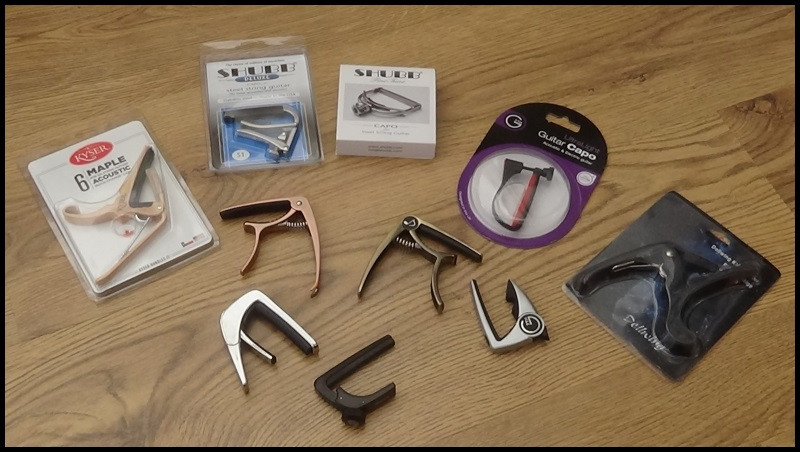 Excited with new capos
Excited with new capos
Ease of Use
Capo usability varies significantly. Some are cumbersome to attach, detach, or reposition between frets. To evaluate this, I performed a ‘one-handed test’ for each capo to gauge its user-friendliness and convenience.
Build Quality
Durability is crucial for any guitar accessory. A reliable capo should be robust and withstand frequent use. There’s little value in a capo that breaks down quickly, especially considering the occasional drops and bumps that are part of normal use. This section assesses the sturdiness and construction quality of each capo.
Value for Money
The capos reviewed span a wide price range, from premium options like the Thalia 200 ($79.99) to budget-friendly choices like the Donner DC-2 ($8.49). Most fall within the $10-$30 range. Prices mentioned are based on U.S. Amazon listings and manufacturer sites, though availability and pricing may vary.
Rating System
Based on the above criteria, each capo received a rating out of 5, using ‘G’s (for ‘guitar’) instead of stars – a bit of guitar-themed fun!
Here’s the breakdown of our ‘G’ rating system:
GGGGG Awesome!
GGGG Very good but not quite perfect!
GGG Good but with faults!
GG A little shoddy!
G Oh oh, this is pretty poor!
Review Results: Finding the Best Acoustic Guitar Capo
Presented in the order they were unboxed, here are my detailed assessments of each capo.
Shubb S1
Features
The Shubb S1 is crafted from stainless steel and features an adjustable screw mechanism designed for precise tuning at any fret. While the S1 is versatile for most acoustic and electric guitars, Shubb offers specialized models for classical and 12-string guitars.
Tuning
Across all four test guitars, the Shubb S1 demonstrated excellent tuning and intonation at various fret positions. Fine-tuning is easily achieved with a slight turn of the adjustment screw while the capo is in place. It maintains accuracy even with substantial fret changes, except for extreme jumps like from fret 1 to fret 10.
Ease of Use
While not overly complicated, the Shubb S1 is slightly more intricate than some other capos. However, with a bit of practice, one-handed placement becomes manageable. Adjusting intonation with the screw is straightforward and user-friendly.
Build Quality
I tested the deluxe stainless steel model, which Shubb claims is more resistant to scratches and wear than the standard brass and nickel-plated version. Manufactured and assembled in the USA, the Shubb S1 exhibits excellent craftsmanship. It feels and looks like a high-quality piece of equipment.
Value For Money
Despite being slightly less convenient than some capos and requiring adjustment for optimal tuning on different guitars, the Shubb S1 offers exceptional value. It combines a reasonable price point with high quality and accurate performance.
The Shubb S1 balances minor inconvenience with significant value, making it a worthwhile addition to any guitarist’s toolkit.
Rating
GGGGG
Get it!
Adagio Pro Deluxe
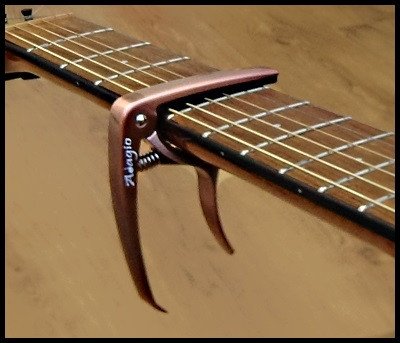 Adagio Pro Deluxe Capo
Adagio Pro Deluxe Capo
Features
The Adagio Pro Deluxe is a typical budget-friendly, spring-loaded capo. Uniquely, it includes a peg-puller inlay at the end, a surprisingly useful feature for acoustic guitar string changes.
Tuning
Unfortunately, the Adagio Pro Deluxe suffers from significant tuning problems. It consistently rendered notes sharp, required precise positioning to avoid string buzz, and exhibited noticeably poor sustain.
Ease of Use
Like most spring-loaded capos, it’s easy to use. However, the narrow gap between the clamp and arm can catch strings during application, potentially bending them and worsening tuning issues.
Build Quality
The build quality is surprisingly robust. It feels solid and durable, suggesting it could withstand regular use.
Value For Money
While inexpensive and seemingly durable, the severe tuning problems make the Adagio Pro Deluxe a poor value.
Regardless of its features or ease of use, a capo’s primary function is to facilitate accurate tuning. The Adagio Pro Deluxe fails in this crucial aspect, making it a capo to avoid.
Rating
GG
Get it!
- Amazon
- Manufacturer: No website available
G7th Performance 2
Features
The G7th Performance 2 distinguishes itself from many capos by using G7th’s innovative “Unique Tension Control System” instead of a spring mechanism. This system allows users to precisely control the pressure applied to the guitar neck.
Tuning
The tension control system effectively eliminates tuning issues typically associated with spring-loaded capos. By manually adjusting the pressure, you avoid the common problem of excessive clamping force. Minor tuning adjustments are easily made by slightly squeezing or loosening the capo.
Ease of Use
The G7th Performance 2 is remarkably user-friendly. Minimal adjustment is needed to achieve precise tuning. Simply place it on the strings, squeeze until it feels right, and you’re ready to play. Its intuitive design and one-handed operation make it exceptionally convenient.
Build Quality
The build quality is outstanding. It feels compact, solid, and very durable. It withstands accidental drops without damage, demonstrating its robust construction.
Value For Money
Though a bit pricier, the Performance 2 is a worthwhile investment. It offers superior performance and durability, justifying its cost.
The G7th Performance 2 combines ease of use, perfect tuning, and robust build quality in a stylish, clamp-style design. It’s a top-tier capo that performs exceptionally well.
Rating
GGGGG
Get it!
Dellwing
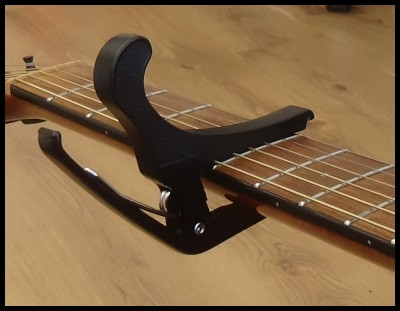 Dellwing Capo
Dellwing Capo
Features
The Dellwing is another budget-oriented, spring-loaded capo. It is notably large and heavy, though the reason for its heft is unclear. It’s a basic, no-frills capo.
Tuning
Surprisingly, for a budget spring-loaded model, the Dellwing performs well in tuning accuracy. It maintained accurate tuning across three of the four test guitars. The Aria guitar showed slight sharpness at most frets, but overall, the tuning performance was a pleasant surprise.
Ease of Use
The Dellwing is straightforward to use, but its large size and wide clamp spacing can be challenging for users with smaller hands. Squeezing the clamps requires a specific hand position, sometimes necessitating a two-handed operation.
Build Quality
The Dellwing feels exceptionally sturdy and robust, perhaps even overbuilt. While its aesthetic might be considered basic, it’s built to last. However, its weight and bulk might pose a risk of damage if dropped on a guitar.
Value For Money
The Dellwing offers good value due to its surprising tuning accuracy and durable build.
For a spring-loaded capo in its price range, the Dellwing is accurate, easy to use (mostly), and performs reliably across various frets without requiring excessive hand strength.
Rating
GGGG
Get it!
- Amazon
- Manufacturer: No website available
G7th UltraLight
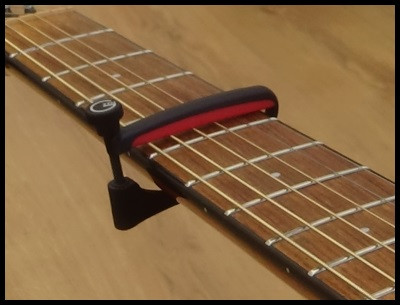 G7th UltraLight Capo
G7th UltraLight Capo
Features
The G7th UltraLight is a screw-style capo, designed as a budget-friendly option that maintains good tuning stability and sustain. It is remarkably lightweight, weighing only 8 grams.
Tuning
As a screw-based capo, the UltraLight provides user-controlled tension, resulting in accurate tuning across all four test guitars. However, achieving precise tuning required some tweaking and monitoring with a tuner, making it less intuitive than some other screw-based capos.
Ease of Use
Like most screw-type capos, the UltraLight isn’t as user-friendly as quick-release models. One-handed placement is not feasible, though one-handed removal and fret repositioning are manageable. Care is needed to avoid unscrewing it too much, as the screw can detach, although it’s easily reinserted.
Build Quality
The UltraLight is reasonably well-made but feels somewhat delicate due to its light weight. While it seems durable enough for normal use, its flimsy feel is a minor drawback. Flexibility testing showed it to be more resilient than initially perceived.
Value For Money
The UltraLight is affordable and provides accurate tuning, exceeding initial expectations regarding durability. However, its usability and feel are less refined than better alternatives in a similar price range or slightly higher.
For budget-conscious buyers seeking a G7th capo, the Performance 2 is a superior choice, albeit at a higher price. Consider other capos in this review before opting for the UltraLight.
Rating
GGG
Get it!
Donner DC-2
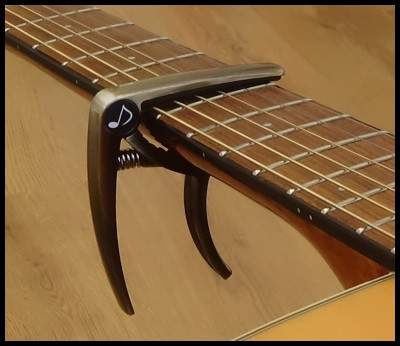 Donner DC-2 Capo
Donner DC-2 Capo
Features
The Donner DC-2 is a spring-loaded capo, advertised with a spring that has “internal memory for strength and fatigue resistance.” Aesthetically, it’s reasonably appealing, though the quaver symbol might be considered slightly cheesy by some.
Tuning
The Donner DC-2, unfortunately, suffers from significant tuning issues typical of many spring-loaded capos, but to a greater extent. Out of the four test guitars, it only tuned accurately on the Aria, likely due to a favorable neck size match. On other guitars, it consistently produced sharp notes across all frets. Sustain also diminished noticeably at higher frets.
Ease of Use
As a standard spring-loaded capo, the DC-2 is easy to operate. One-handed use is simple, and the spring tension is well-balanced. However, caution is needed on guitars with thicker necks to avoid catching strings during placement, which can exacerbate tuning problems.
Build Quality
The build quality is surprisingly solid and robust, suggesting good durability.
Value For Money
Despite positive Amazon reviews, the Donner DC-2’s poor tuning performance negates its low price.
Despite its affordability and solid build, the Donner DC-2 is ultimately a poor choice due to its significant tuning inaccuracies. The positive Amazon reviews are perplexing given its performance issues.
Rating
GG
Get it!
Shubb F1
Features
The Shubb F1 is among the more expensive capos in this review. It features a classic yoke-style design, intended to be left on the guitar even when not in use. It can be conveniently moved past the nut and lightly tightened for storage, reducing the risk of loss.
Tuning
The Shubb F1 offers exceptional tuning accuracy. Its adjustable screw allows for precise tension control, providing optimal tuning across different guitars. The yoke design applies pressure evenly across the neck, unlike clamp-style capos that can exert uneven pressure.
Ease of Use
The F1 is very user-friendly, featuring an adjustment knob for easy tension modification. On the Cort guitar, with its higher action and thicker neck, more tightening was needed at higher frets, but overall, operation is smooth. For very wide necks, the F3 model is recommended.
Build Quality
The Shubb F1 is exceptionally well-built and durable, almost jewel-like in its precision. It significantly surpasses budget capos in terms of materials and construction.
Value For Money
Although expensive initially, the Shubb F1 provides excellent long-term value due to its high quality, durability, ease of use, and reduced risk of loss.
The Shubb F1 is a premium capo that combines classic aesthetics with superior performance and durability, making it a worthwhile investment despite the higher price.
Rating
GGGGG
Get it!
- Amazon: Currently unavailable on Amazon
- Manufacturer
Thalia 200
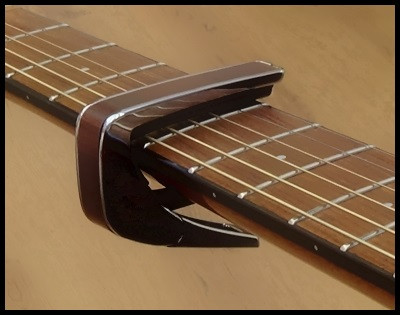 Thalia 200 Capo
Thalia 200 Capo
Features
The Thalia 200 stands out with its interchangeable fretpad system, including 7 different fretpads to match various guitar fretboard radiuses. This unique feature aims to eliminate tuning problems associated with standard clamp capos by ensuring optimal pressure distribution.
Tuning
Initial testing with the standard fretpad revealed the need for adjustment to achieve accurate tuning across all four guitars. However, once the correct fretpad was selected for each guitar, tuning accuracy became virtually perfect up and down the neck.
Ease of Use
The Thalia 200 is straightforward to use, with a quick start guide for initial setup. It moves easily along the neck and allows for effortless one-handed operation. Changing fretpads is quick and simple, ideal for use across multiple guitars.
Build Quality
The Thalia 200 exhibits exceptional build quality and craftsmanship. The Santos rosewood inlay and overall design exude luxury and attention to detail.
Value For Money
While one of the pricier options, the Thalia 200 offers unmatched tuning accuracy, versatility, and ease of use.
The Thalia 200 is a top-tier, professional-grade capo, justifying its price with superior performance, customization, and elegant design.
Rating
GGGGG
Get it!
D’Addario/Planet Waves NS
Features
The D’Addario/Planet Waves NS capo is a long-standing favorite, known for its reliability. It features a simple, black design with a screw for adjusting string pressure.
Tuning
The NS capo has consistently provided good tuning performance. Testing confirmed its reliable tuning, although it requires firm tightening, as one side can sometimes lack clamping power compared to the screw side.
Ease of Use
Screw-type capos like the NS are generally less quick to use than quick-release models but often offer better tuning. The NS is reasonably easy to use, and one-handed operation is possible with some practice, particularly at lower frets. Higher frets might require two hands for optimal clamping.
Build Quality
The NS capo is solidly built, though not exceptionally refined. Made from molded ABS thermoplastic, it is durable and functional, with minimal parts and good construction.
The D’Addario/Planet Waves NS is a reliable, affordable, and functional capo, making it an excellent choice for a primary or backup capo. It prioritizes functionality and value over elaborate features.
Rating
GGGG
Get it!
Kyser
Features
The Kyser Quick Change capo is a spring-based capo known for its ease of use and aesthetic appeal. The maple finish tested is particularly attractive, and Kyser offers a wide range of colors.
Tuning
Tuning performance is generally good but requires some practice to find the optimal placement for precise tuning. After a break-in period, it tuned accurately on three of the four test guitars, but less effectively on the Les Paul, where it tended to produce slightly sharp notes.
Ease of Use
The Kyser is very easy to use, though the spring is quite tight, requiring a firm grip. Its design, which encourages placement from the bass side, prevents hand obstruction, a thoughtful ergonomic detail.
Build Quality
The Kyser is well-made, with a robust feel that belies its price. The varnished finish enhances its appearance and tactile quality.
Value For Money
The Kyser offers excellent value, combining good performance with a reasonable price. Despite being slightly tight and less effective on the Les Paul, it is a very good capo overall.
Rating
GGGG
Get it!
Conclusion: What is the Best Acoustic Guitar Capo?
Most of the capos reviewed performed well, some were exceptional, and a few were subpar.
My top recommendations are the Shubb F1, Thalia 200, and G7th Performance 2. These three excel in tuning accuracy, ease of use, build quality, and overall design. While not the cheapest, they demonstrate that superior quality justifies a higher price. If I had to choose just one, the G7th Performance 2 would narrowly take the lead, but all three are outstanding.
Contrary to the idea of specialized capos for acoustic or electric guitars, these top performers prove that a great capo is universally effective.
For those on a tighter budget, the D’Addario, Kyser, or Dellwing offer reliable performance across various guitars.
Remember to consider neck size, as some manufacturers offer different capo sizes for wider necks.
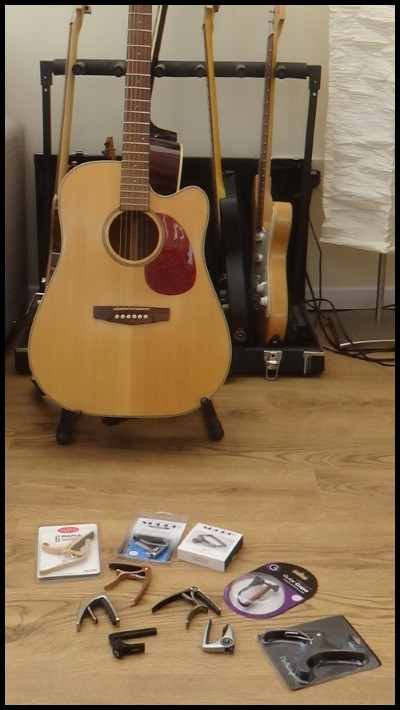 Capos and Guitars
Capos and Guitars
Testing Methodology Details
The capos were tested on the following guitars, chosen for their diverse neck profiles:
- Cort MR-710F
- Aria AGP-001
- Yamaha Pacifica 812v
- Epiphone Les Paul
All guitars were meticulously intonated, and tuning was verified before each capo test to ensure accurate assessment of capo-induced tuning issues. While testing focused primarily on acoustic guitars, electric guitars were also included for broader evaluation.
Beyond tuning tests, practical playability was assessed using pieces from songs like Fast Car and Scarborough Fair. These songs provided a range of fingerpicking and strumming techniques, relevant to capo use.
I plan to continue these round-up reviews if you find them helpful. Your feedback is valuable, so please leave a comment below sharing your thoughts on these capos, your favorites, or least favorites!
